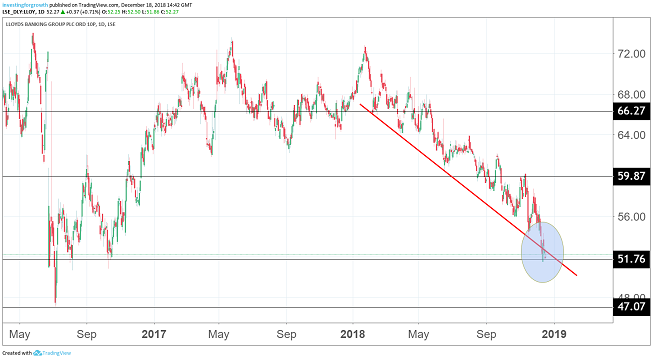Why Lloyds Banking shares make this top 10
18th December 2018 14:38
by Graeme Evans from interactive investor
If this industry expert has got their sums right Lloyds Banking Group shares could hit a three-year high. Graeme Evans explains how.

As the wait for a share price rebound at Lloyds Banking Group goes on, the lender's army of small shareholders have been given another reminder about the stock's potential should current Brexit uncertainty ever pass.
That's because UBS banking analysts have gone as far as to name Lloyds among its top 10 most preferred stocks in the global banking sector for 2019. With a continued price target of 80p, the UBS recommendation would take Lloyds shares back to a position they last occupied in the summer of 2015.
The recent performance for Lloyds shares has been dismal and frustrating, even though a vast improvement in the company's balance sheet strength has enabled a return of dividends and share buy-backs.
The Lloyds share price is now languishing where it was in late 2016, having traded in a narrow range over the past two years. Unfortunately for Lloyds, it has to bear the additional weight of being seen as a proxy for the UK economy, whose growth has been hampered by the Brexit dilemma.
While UK banking stocks have been out of favour for some time, things haven’t been much better for the sector globally after a 13% drop in value in the first 11 months of the year.
This reflects a broad range of top-down factors, such as trade war uncertainties, rising interest rates in the United States, and emerging market risk aversion. European banks have been the weakest performers, down 27% in the year to date and below the local market by 21%, according to UBS.

Source: TradingView (*) Past performance is not a guide to future performance
The key question for UBS is whether the lending cycle has further to go. They believe we are late in the cycle in Australia and to a lesser extent in the US, but earlier in Europe, which chimes with the recent outlook for GDP growth of 1.5%.
Overall, they described the risk/reward profile for the sector as attractive:
"Global banks have continued to rebuild profitability and returns, with sector Return on Equity (RoE) recovering from 10.8% in 2017 to 11.9% in 2018. Currently, we forecast RoE of 12.2% in 2019."
Alongside Lloyds, the other European banks singled out for attention in today's top 10 list include France's Credit Agricole and Benelux-based ING. In recent months, UBS has also been supportive of Barclays and Royal Bank of Scotland.
In the meantime, Lloyds and other UK shares are in limbo due to ongoing fears that a hard Brexit will leave consumers exposed to the worst financial crash since the 1930s. Despite this threat, the group's most recent quarterly results in October showed a business making progress on a number of fronts.
Measures for return on capital and earnings per share were strongly ahead, while the cost/income ratio fell to an impressive 47.5%. The bank's ability to generate cash not only underpins the current 6% dividend yield, but also the prospect of share buy-backs forecast to top £1 billion.
There was also no need for an additional PPI provision in October's figures, whilst Lloyds continues to tighten its grip in the digital space.
*Horizontal lines on charts represent levels of previous technical support and resistance. Trendlines are marked in red.
These articles are provided for information purposes only. Occasionally, an opinion about whether to buy or sell a specific investment may be provided by third parties. The content is not intended to be a personal recommendation to buy or sell any financial instrument or product, or to adopt any investment strategy as it is not provided based on an assessment of your investing knowledge and experience, your financial situation or your investment objectives. The value of your investments, and the income derived from them, may go down as well as up. You may not get back all the money that you invest. The investments referred to in this article may not be suitable for all investors, and if in doubt, an investor should seek advice from a qualified investment adviser.
Full performance can be found on the company or index summary page on the interactive investor website. Simply click on the company's or index name highlighted in the article.